An Ethical Analysis of Corporate Social Responsibility in Adoption
VerifiedAdded on 2020/05/16
|6
|1344
|142
Essay
AI Summary
This essay presents a detailed literature review of a case involving a same-sex couple applying to adopt a child, and the ethical concerns of the adoption manager. The review assesses the couple's suitability based on financial stability, living conditions, and other factors. The core ethical question is whether the manager should refuse the application due to personal or religious beliefs, even if the couple meets all requirements. The paper explores various ethical theories, including cultural relativism, naïve relativism, role relativism, social group relativism, and utilitarianism, to determine the ethical implications of the situation. It examines the potential emotional and mental impact on the child and proposes measures to ensure the child's safety and happiness, ultimately concluding that the manager's refusal is ethically justifiable under the framework of naïve relativism. The paper emphasizes the potential harm to the child and the limitations of the agency in ensuring the child's well-being within a same-sex household.
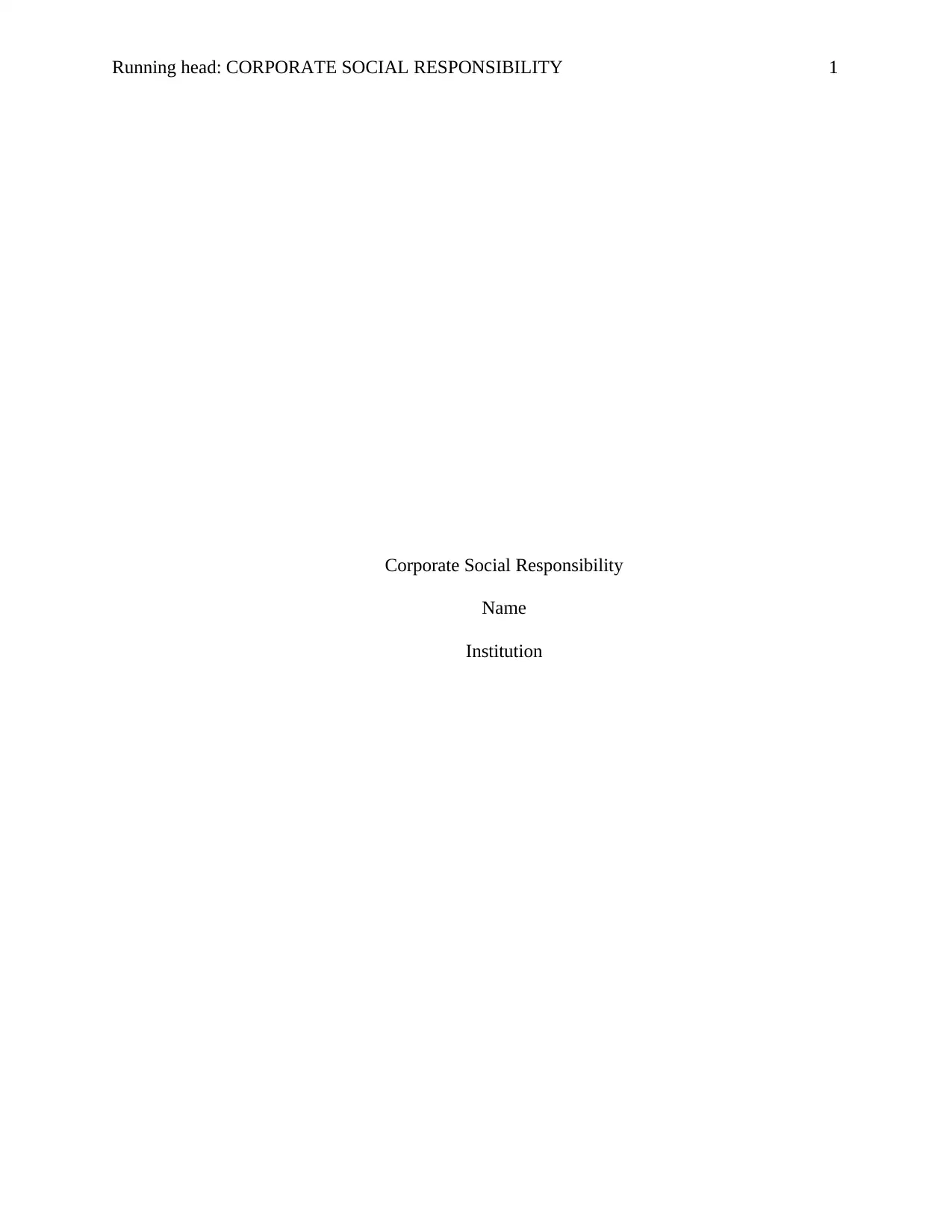
Running head: CORPORATE SOCIAL RESPONSIBILITY 1
Corporate Social Responsibility
Name
Institution
Corporate Social Responsibility
Name
Institution
Paraphrase This Document
Need a fresh take? Get an instant paraphrase of this document with our AI Paraphraser
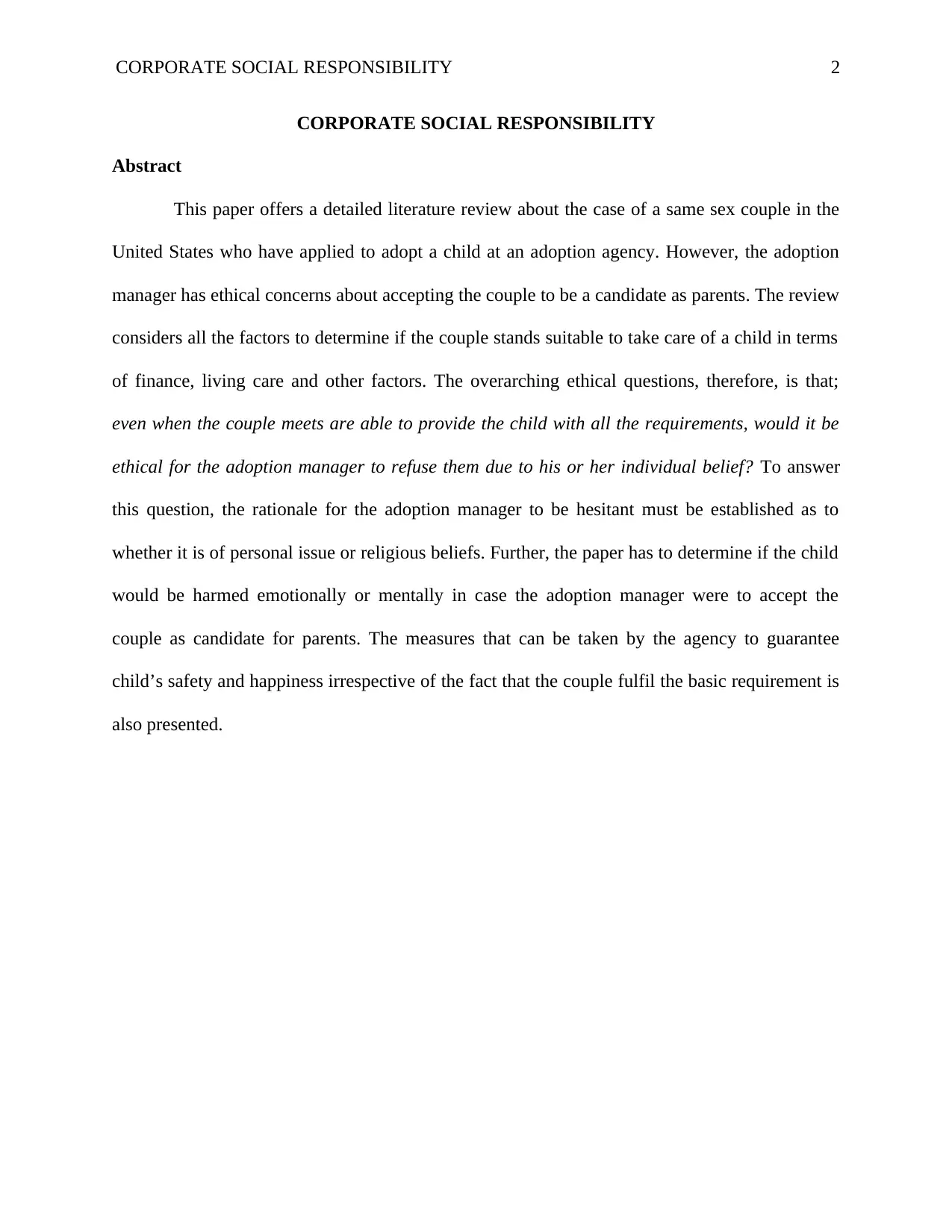
CORPORATE SOCIAL RESPONSIBILITY 2
CORPORATE SOCIAL RESPONSIBILITY
Abstract
This paper offers a detailed literature review about the case of a same sex couple in the
United States who have applied to adopt a child at an adoption agency. However, the adoption
manager has ethical concerns about accepting the couple to be a candidate as parents. The review
considers all the factors to determine if the couple stands suitable to take care of a child in terms
of finance, living care and other factors. The overarching ethical questions, therefore, is that;
even when the couple meets are able to provide the child with all the requirements, would it be
ethical for the adoption manager to refuse them due to his or her individual belief? To answer
this question, the rationale for the adoption manager to be hesitant must be established as to
whether it is of personal issue or religious beliefs. Further, the paper has to determine if the child
would be harmed emotionally or mentally in case the adoption manager were to accept the
couple as candidate for parents. The measures that can be taken by the agency to guarantee
child’s safety and happiness irrespective of the fact that the couple fulfil the basic requirement is
also presented.
CORPORATE SOCIAL RESPONSIBILITY
Abstract
This paper offers a detailed literature review about the case of a same sex couple in the
United States who have applied to adopt a child at an adoption agency. However, the adoption
manager has ethical concerns about accepting the couple to be a candidate as parents. The review
considers all the factors to determine if the couple stands suitable to take care of a child in terms
of finance, living care and other factors. The overarching ethical questions, therefore, is that;
even when the couple meets are able to provide the child with all the requirements, would it be
ethical for the adoption manager to refuse them due to his or her individual belief? To answer
this question, the rationale for the adoption manager to be hesitant must be established as to
whether it is of personal issue or religious beliefs. Further, the paper has to determine if the child
would be harmed emotionally or mentally in case the adoption manager were to accept the
couple as candidate for parents. The measures that can be taken by the agency to guarantee
child’s safety and happiness irrespective of the fact that the couple fulfil the basic requirement is
also presented.
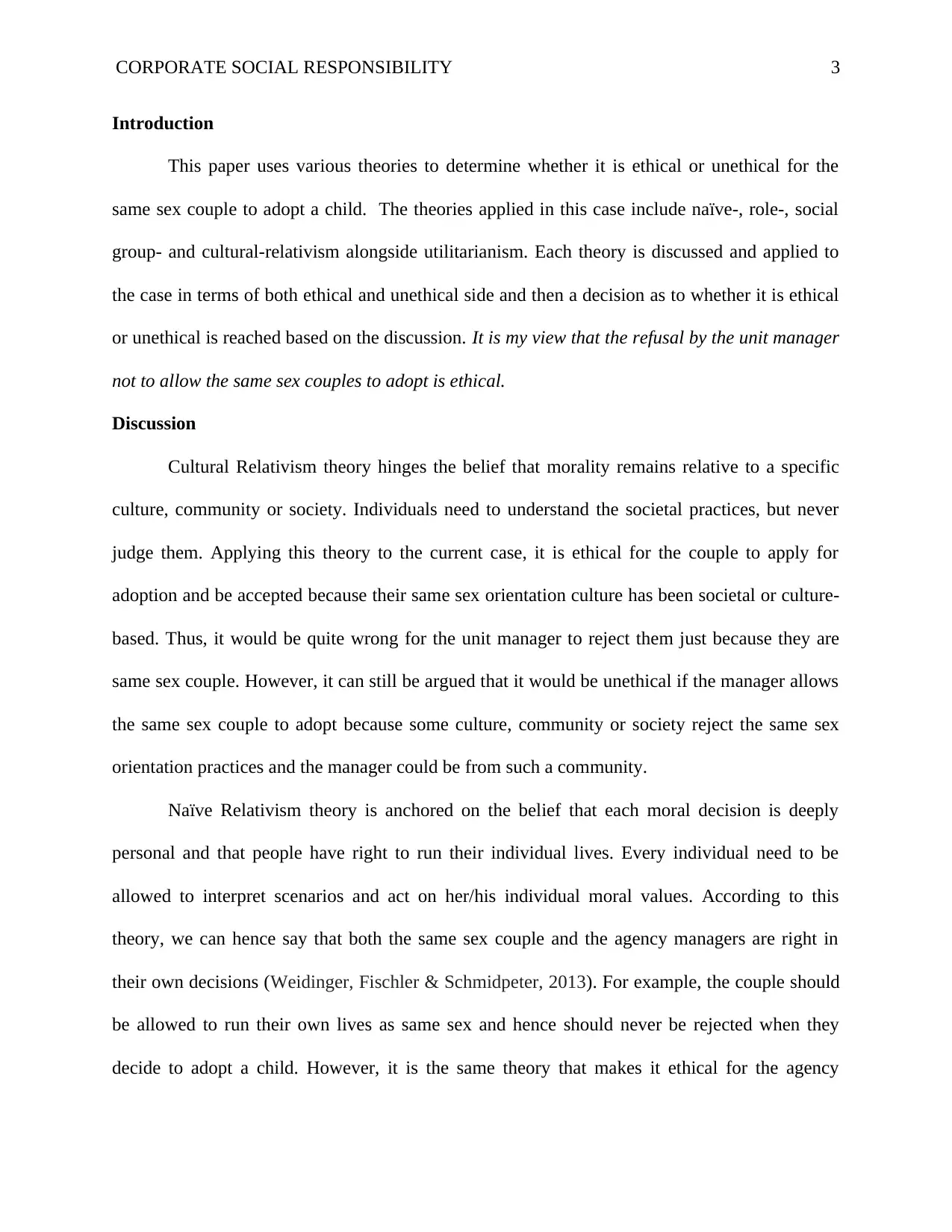
CORPORATE SOCIAL RESPONSIBILITY 3
Introduction
This paper uses various theories to determine whether it is ethical or unethical for the
same sex couple to adopt a child. The theories applied in this case include naïve-, role-, social
group- and cultural-relativism alongside utilitarianism. Each theory is discussed and applied to
the case in terms of both ethical and unethical side and then a decision as to whether it is ethical
or unethical is reached based on the discussion. It is my view that the refusal by the unit manager
not to allow the same sex couples to adopt is ethical.
Discussion
Cultural Relativism theory hinges the belief that morality remains relative to a specific
culture, community or society. Individuals need to understand the societal practices, but never
judge them. Applying this theory to the current case, it is ethical for the couple to apply for
adoption and be accepted because their same sex orientation culture has been societal or culture-
based. Thus, it would be quite wrong for the unit manager to reject them just because they are
same sex couple. However, it can still be argued that it would be unethical if the manager allows
the same sex couple to adopt because some culture, community or society reject the same sex
orientation practices and the manager could be from such a community.
Naïve Relativism theory is anchored on the belief that each moral decision is deeply
personal and that people have right to run their individual lives. Every individual need to be
allowed to interpret scenarios and act on her/his individual moral values. According to this
theory, we can hence say that both the same sex couple and the agency managers are right in
their own decisions (Weidinger, Fischler & Schmidpeter, 2013). For example, the couple should
be allowed to run their own lives as same sex and hence should never be rejected when they
decide to adopt a child. However, it is the same theory that makes it ethical for the agency
Introduction
This paper uses various theories to determine whether it is ethical or unethical for the
same sex couple to adopt a child. The theories applied in this case include naïve-, role-, social
group- and cultural-relativism alongside utilitarianism. Each theory is discussed and applied to
the case in terms of both ethical and unethical side and then a decision as to whether it is ethical
or unethical is reached based on the discussion. It is my view that the refusal by the unit manager
not to allow the same sex couples to adopt is ethical.
Discussion
Cultural Relativism theory hinges the belief that morality remains relative to a specific
culture, community or society. Individuals need to understand the societal practices, but never
judge them. Applying this theory to the current case, it is ethical for the couple to apply for
adoption and be accepted because their same sex orientation culture has been societal or culture-
based. Thus, it would be quite wrong for the unit manager to reject them just because they are
same sex couple. However, it can still be argued that it would be unethical if the manager allows
the same sex couple to adopt because some culture, community or society reject the same sex
orientation practices and the manager could be from such a community.
Naïve Relativism theory is anchored on the belief that each moral decision is deeply
personal and that people have right to run their individual lives. Every individual need to be
allowed to interpret scenarios and act on her/his individual moral values. According to this
theory, we can hence say that both the same sex couple and the agency managers are right in
their own decisions (Weidinger, Fischler & Schmidpeter, 2013). For example, the couple should
be allowed to run their own lives as same sex and hence should never be rejected when they
decide to adopt a child. However, it is the same theory that makes it ethical for the agency
⊘ This is a preview!⊘
Do you want full access?
Subscribe today to unlock all pages.

Trusted by 1+ million students worldwide
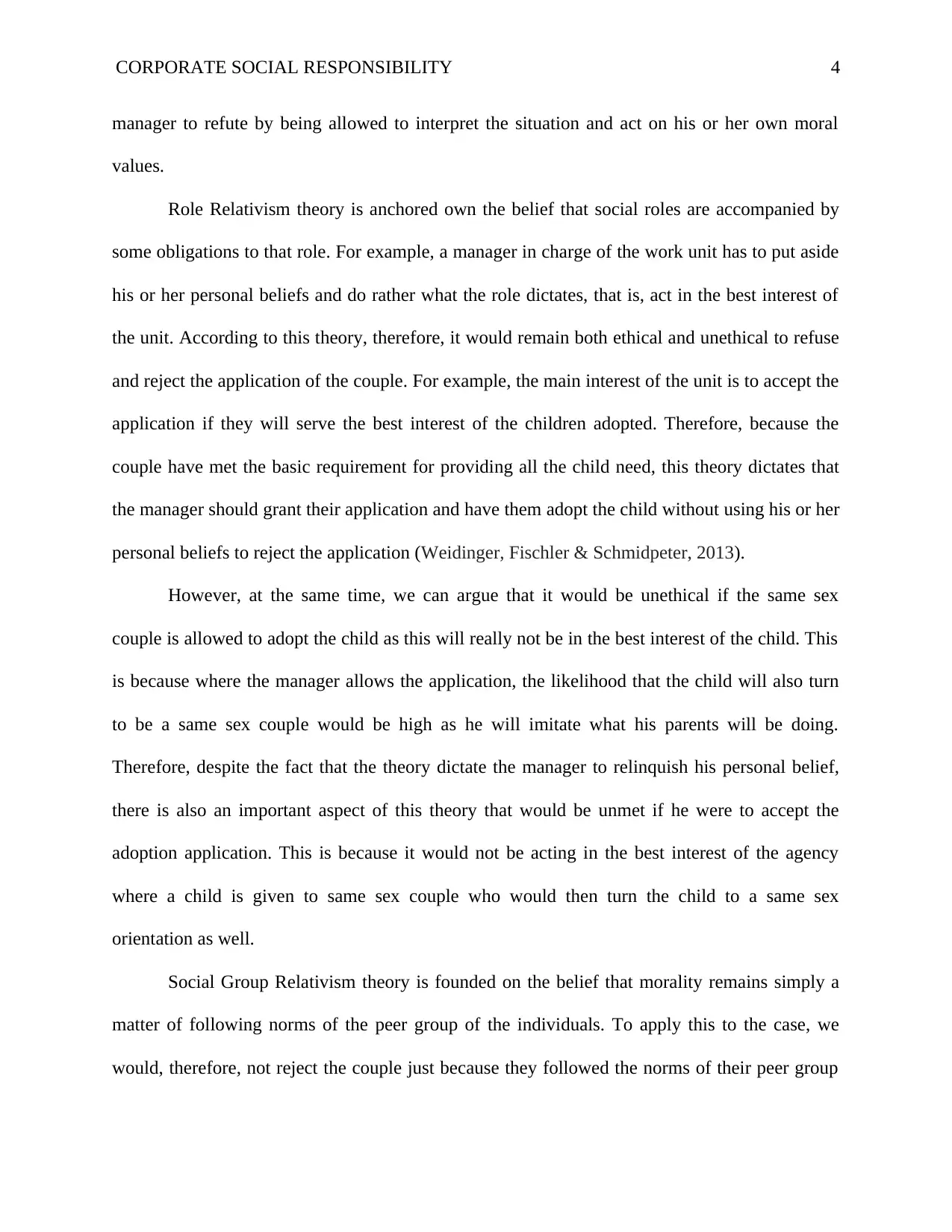
CORPORATE SOCIAL RESPONSIBILITY 4
manager to refute by being allowed to interpret the situation and act on his or her own moral
values.
Role Relativism theory is anchored own the belief that social roles are accompanied by
some obligations to that role. For example, a manager in charge of the work unit has to put aside
his or her personal beliefs and do rather what the role dictates, that is, act in the best interest of
the unit. According to this theory, therefore, it would remain both ethical and unethical to refuse
and reject the application of the couple. For example, the main interest of the unit is to accept the
application if they will serve the best interest of the children adopted. Therefore, because the
couple have met the basic requirement for providing all the child need, this theory dictates that
the manager should grant their application and have them adopt the child without using his or her
personal beliefs to reject the application (Weidinger, Fischler & Schmidpeter, 2013).
However, at the same time, we can argue that it would be unethical if the same sex
couple is allowed to adopt the child as this will really not be in the best interest of the child. This
is because where the manager allows the application, the likelihood that the child will also turn
to be a same sex couple would be high as he will imitate what his parents will be doing.
Therefore, despite the fact that the theory dictate the manager to relinquish his personal belief,
there is also an important aspect of this theory that would be unmet if he were to accept the
adoption application. This is because it would not be acting in the best interest of the agency
where a child is given to same sex couple who would then turn the child to a same sex
orientation as well.
Social Group Relativism theory is founded on the belief that morality remains simply a
matter of following norms of the peer group of the individuals. To apply this to the case, we
would, therefore, not reject the couple just because they followed the norms of their peer group
manager to refute by being allowed to interpret the situation and act on his or her own moral
values.
Role Relativism theory is anchored own the belief that social roles are accompanied by
some obligations to that role. For example, a manager in charge of the work unit has to put aside
his or her personal beliefs and do rather what the role dictates, that is, act in the best interest of
the unit. According to this theory, therefore, it would remain both ethical and unethical to refuse
and reject the application of the couple. For example, the main interest of the unit is to accept the
application if they will serve the best interest of the children adopted. Therefore, because the
couple have met the basic requirement for providing all the child need, this theory dictates that
the manager should grant their application and have them adopt the child without using his or her
personal beliefs to reject the application (Weidinger, Fischler & Schmidpeter, 2013).
However, at the same time, we can argue that it would be unethical if the same sex
couple is allowed to adopt the child as this will really not be in the best interest of the child. This
is because where the manager allows the application, the likelihood that the child will also turn
to be a same sex couple would be high as he will imitate what his parents will be doing.
Therefore, despite the fact that the theory dictate the manager to relinquish his personal belief,
there is also an important aspect of this theory that would be unmet if he were to accept the
adoption application. This is because it would not be acting in the best interest of the agency
where a child is given to same sex couple who would then turn the child to a same sex
orientation as well.
Social Group Relativism theory is founded on the belief that morality remains simply a
matter of following norms of the peer group of the individuals. To apply this to the case, we
would, therefore, not reject the couple just because they followed the norms of their peer group
Paraphrase This Document
Need a fresh take? Get an instant paraphrase of this document with our AI Paraphraser
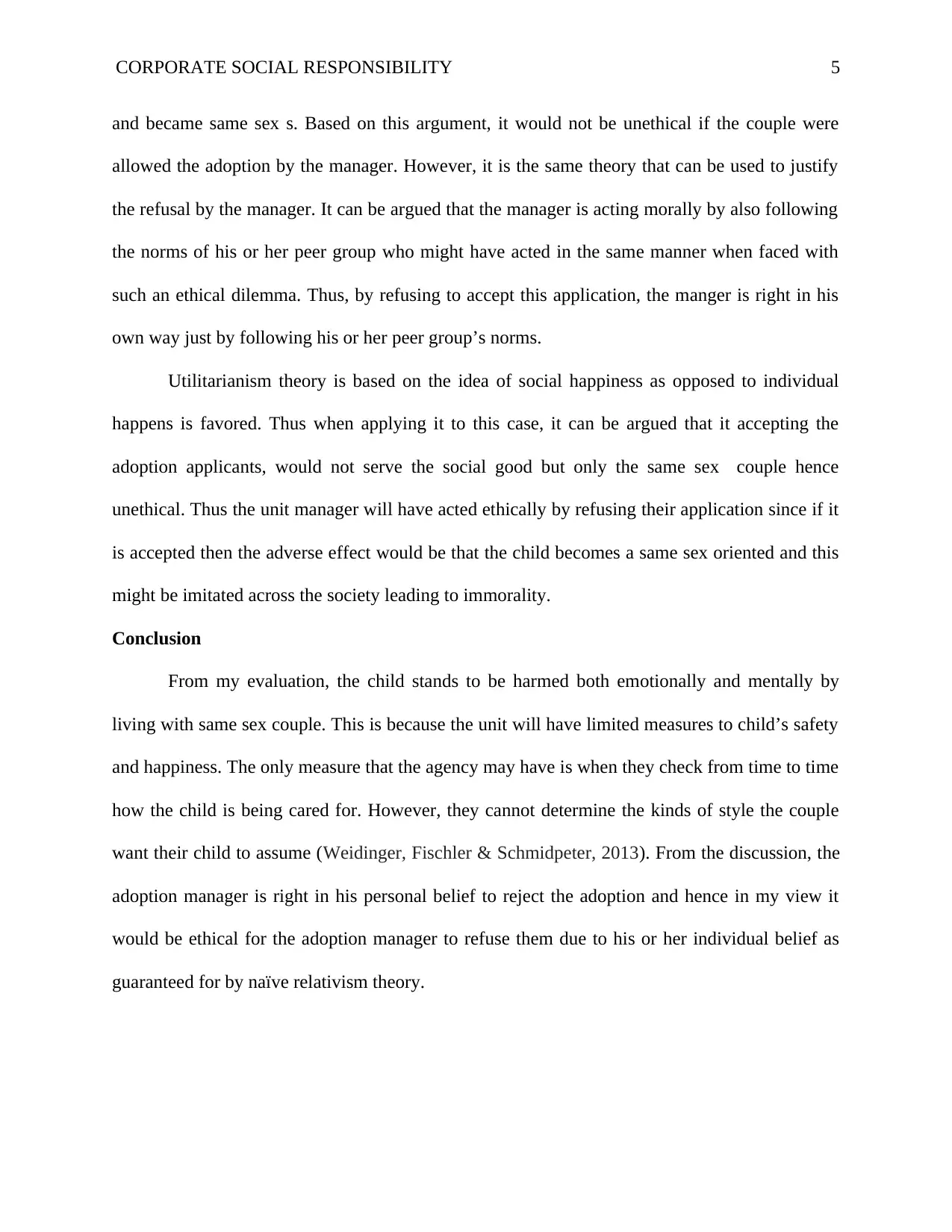
CORPORATE SOCIAL RESPONSIBILITY 5
and became same sex s. Based on this argument, it would not be unethical if the couple were
allowed the adoption by the manager. However, it is the same theory that can be used to justify
the refusal by the manager. It can be argued that the manager is acting morally by also following
the norms of his or her peer group who might have acted in the same manner when faced with
such an ethical dilemma. Thus, by refusing to accept this application, the manger is right in his
own way just by following his or her peer group’s norms.
Utilitarianism theory is based on the idea of social happiness as opposed to individual
happens is favored. Thus when applying it to this case, it can be argued that it accepting the
adoption applicants, would not serve the social good but only the same sex couple hence
unethical. Thus the unit manager will have acted ethically by refusing their application since if it
is accepted then the adverse effect would be that the child becomes a same sex oriented and this
might be imitated across the society leading to immorality.
Conclusion
From my evaluation, the child stands to be harmed both emotionally and mentally by
living with same sex couple. This is because the unit will have limited measures to child’s safety
and happiness. The only measure that the agency may have is when they check from time to time
how the child is being cared for. However, they cannot determine the kinds of style the couple
want their child to assume (Weidinger, Fischler & Schmidpeter, 2013). From the discussion, the
adoption manager is right in his personal belief to reject the adoption and hence in my view it
would be ethical for the adoption manager to refuse them due to his or her individual belief as
guaranteed for by naïve relativism theory.
and became same sex s. Based on this argument, it would not be unethical if the couple were
allowed the adoption by the manager. However, it is the same theory that can be used to justify
the refusal by the manager. It can be argued that the manager is acting morally by also following
the norms of his or her peer group who might have acted in the same manner when faced with
such an ethical dilemma. Thus, by refusing to accept this application, the manger is right in his
own way just by following his or her peer group’s norms.
Utilitarianism theory is based on the idea of social happiness as opposed to individual
happens is favored. Thus when applying it to this case, it can be argued that it accepting the
adoption applicants, would not serve the social good but only the same sex couple hence
unethical. Thus the unit manager will have acted ethically by refusing their application since if it
is accepted then the adverse effect would be that the child becomes a same sex oriented and this
might be imitated across the society leading to immorality.
Conclusion
From my evaluation, the child stands to be harmed both emotionally and mentally by
living with same sex couple. This is because the unit will have limited measures to child’s safety
and happiness. The only measure that the agency may have is when they check from time to time
how the child is being cared for. However, they cannot determine the kinds of style the couple
want their child to assume (Weidinger, Fischler & Schmidpeter, 2013). From the discussion, the
adoption manager is right in his personal belief to reject the adoption and hence in my view it
would be ethical for the adoption manager to refuse them due to his or her individual belief as
guaranteed for by naïve relativism theory.
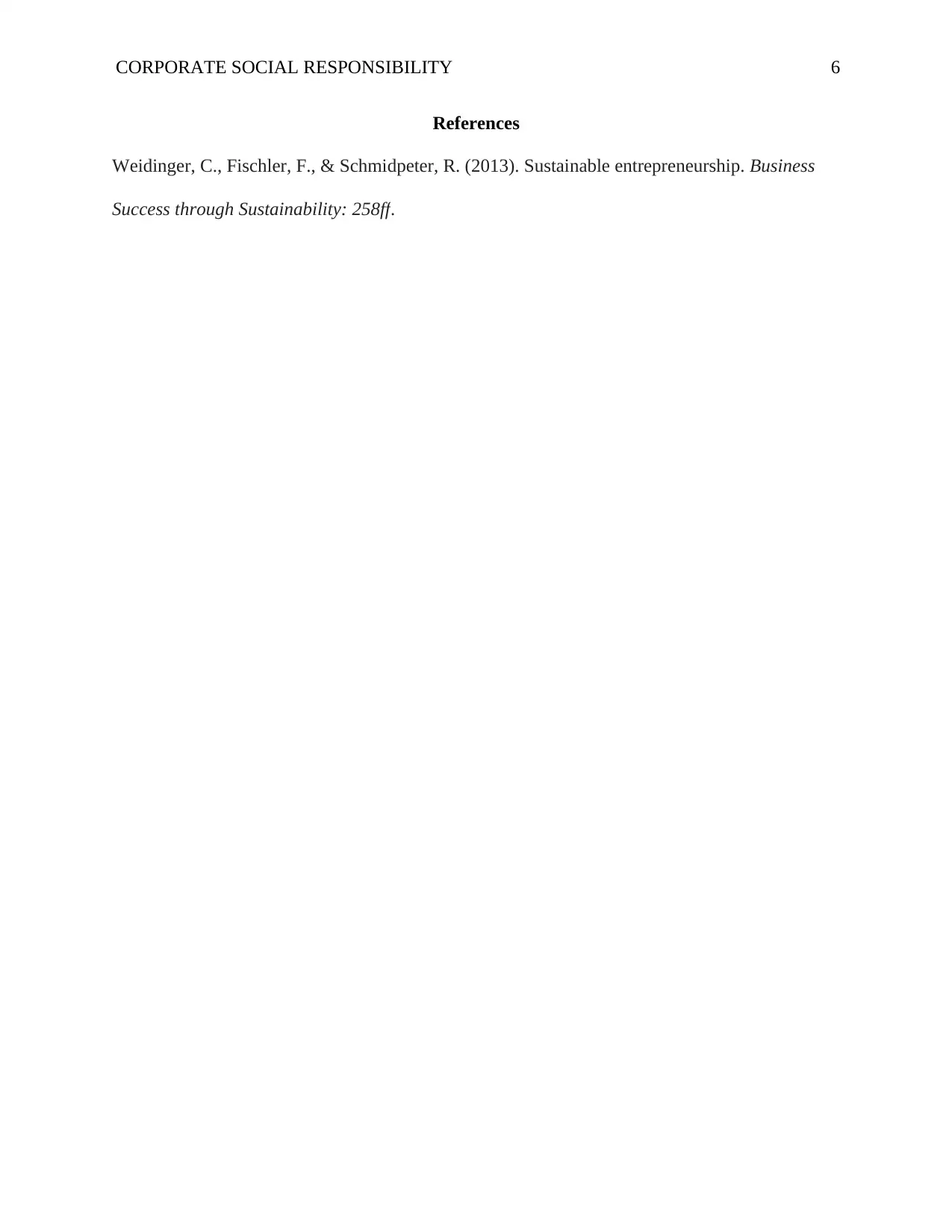
CORPORATE SOCIAL RESPONSIBILITY 6
References
Weidinger, C., Fischler, F., & Schmidpeter, R. (2013). Sustainable entrepreneurship. Business
Success through Sustainability: 258ff.
References
Weidinger, C., Fischler, F., & Schmidpeter, R. (2013). Sustainable entrepreneurship. Business
Success through Sustainability: 258ff.
⊘ This is a preview!⊘
Do you want full access?
Subscribe today to unlock all pages.

Trusted by 1+ million students worldwide
1 out of 6
Related Documents
Your All-in-One AI-Powered Toolkit for Academic Success.
+13062052269
info@desklib.com
Available 24*7 on WhatsApp / Email
![[object Object]](/_next/static/media/star-bottom.7253800d.svg)
Unlock your academic potential
Copyright © 2020–2026 A2Z Services. All Rights Reserved. Developed and managed by ZUCOL.



